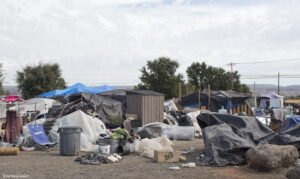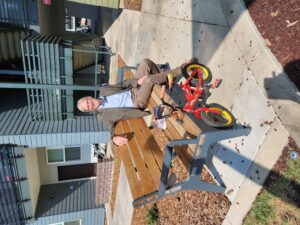by Natalie Hanson
posted June 28
The country’s highest court dropped a landmark decision on the question of civil rights for America’s unhoused people today.

In a decision that many attorneys and activists had predicted, the U.S. Supreme Court has ruled that cities enforcing anti-camping laws are not committing cruel and unusual punishment during evictions of unhoused people. It remanded the City of Grants Pass v. Johnson case back to the lower courts with a ruling that could affect policy in cities like Chico.
“We are reviewing the legal aspects of the opinion and how those legal aspects may apply to the City of Chico …,” said City Manager Mark Sorensen in a statement released this afternoon. “The City Council will be considering options and will provide direction as to next steps.”
Legal Services of Northern California (LSNC), the legal aid agency that represented eight homeless residents in the lawsuit Warren v. Chico, said it was “disappointed” in the Supreme Court ruling. Noting that it represents unhoused people throughout Northern California, LSNC said it was “concerned that the decision will result in some localities overreaching with anti-homeless ordinances seeking to degrade the rights of unhoused Californians and further criminalize homelessness.”
Taylor Bunch, executive director of Chico’s True North Housing Alliance, predicts that the ruling will exacerbate substance use and mental health issues and trap people in chronic homelessness. But regardless of the court’s ruling, this community can commit to solutions, she added.

“… our community, partners, and continuum of care can lead by example by investing in solutions that address the root causes of homelessness,” Bunch said. “Our upcoming Navigation Center will prioritize homelessness prevention and streamline access to services.”
Writing in dissent for the Supreme Court minority in the 6-3 decision was Justice Sonia Sotomayor. She wrote, “The majority focuses almost exclusively on the needs of local governments and leaves the most vulnerable in our society with an impossible choice: Either stay awake or be arrested.”
The Grants Pass challenge
The Grants Pass, Ore., case that was argued before the Supreme Court on April 22 revolves around whether cities that enforce anti-camping laws are violating the Eighth Amendment’s cruel and unusual punishment clause in evicting unhoused people from public spaces. Cities like Chico and San Francisco filed briefs in support of the argument that local government should be allowed broader enforcement authority.
In the Grants Pass case, plaintiffs filed a class-action lawsuit on behalf of homeless people, claiming that the City’s ordinances against public camping violated the Eighth Amendment. That argument was based on the Ninth Circuit ruling in Martin v. Boise — a finding that the cruel and unusual punishment clause bars cities from enforcing public-camping ordinances whenever the number of homeless individuals in a jurisdiction exceeds the number of “practically available” shelter beds.
Martin v. Boise also formed the legal foundation for the 2021 lawsuit, Warren v. Chico. In the Warren lawsuit, eight unhoused plaintiffs challenged Chico’s various ordinances that make it illegal to rest in public in various ways. That lawsuit was settled in 2022, requiring that the City erect more than the 100 pallet shelters that comprise the village named Genesis. The settlement has barred the City from further evictions unless it can show that shelter beds are available.
The ruling’s impact on Chico
LSNC says that the new ruling “neither negates the Chico settlement agreement, nor does it disturb the rights of unhoused people, or any people, to be lawfully present in public spaces. LSNC is confident that the City of Chico intends to honor its commitments to all Chico residents to increase access to safe shelter and to observe the rights of the unsheltered …”
But the City was quick to note — as it has in the past, that it finds the process that was developed for getting approval for “enforcements” — or evictions — burdensome.
“The federal court order in place (AKA: Warren Settlement Agreement) severely restricts and delays the City of Chico’s ability to enforce a variety of historically normal, reasonable and common laws to achieve public safety and public health objectives, and to properly maintain public spaces,” Sorensen’s statement says. “That federal court order will remain in place until a court modifies or sets aside that order.”
Butte County Housing Authority’s outgoing executive director Ed Mayer — who is retiring June 30 — noted that there is a rapidly growing number of unemployed, largely older people who are becoming homeless, and said that “criminalizing” policies make it more difficult to keep track of and help people who desperately need services and housing.

While hopeful that the decision will push elected leaders and officials to come up with new, more humane solutions, he said that local governments have “by and large not shown a propensity for taking that approach.” He pointed out that Butte County has more than double the total number of unhoused people as Josephine County, where Grants Pass is located.
He said the approaches thus far taken by local leaders make him “cynical” about any positive forward movement on more housing for the homeless.
“In my mind, it’s a sad state of affairs, because on the one hand it’s not reasonable to rely on the courts, but if you’re talking about going back to the will of the people, we need people who understand homelessness better,” Mayer said. “We stopped building subsidized housing for low-income elderly and disabled back in the ’90s. We’re seeing the consequences today, and it’s really a choice.”
Court defends enforcement, criminalization
Justice Neil Gorsuch wrote the opinion of the majority. “The Constitution’s Eighth Amendment serves many important functions,” he wrote, “but it does not authorize federal judges to wrest those rights and responsibilities from the American people and in their place dictate this nation’s homelessness policy.
“The Court cannot say that the punishments Grants Pass imposes here qualify as cruel and unusual,” he said. “The city imposes only limited fines for first-time offenders, an order temporarily barring an individual from camping in a public park for repeat offenders, and a maximum sentence of 30 days in jail for those who later violate an order.”
“Homelessness is complex,” the majority wrote. “Its causes are many. So may be the public policy responses required to address it. The question this case presents is whether the Eighth Amendment grants federal judges primary responsibility for assessing those causes and devising those responses.”
Will ruling exacerbate the problem?
Councilmember Addison Winslow agrees with those who say the ruling could worsen the problems at hand. “Before being sued, the Chico City Council’s policies were overtly intended to inflict pain and disgrace,” he said, referring to a series of eviction sweeps at encampments that began several years ago.

“As towns and cities race to adopt new criminalization ordinances, the result will be more people sleeping in more desperate locations, hiding in riparian thickets, and being more regularly scattered. A contest for hostility to the unhoused will bring us no closer to a solution to homelessness.”
Winslow added: “Chico’s Settlement Agreement, however, remains in place so any enhanced criminalization will take place in surrounding jurisdictions long before Chico.”
Homeless community advocates like Mary Kay Benson, who runs the Butte County Shelter for All Facebook page, were unsurprised but nevertheless disillusioned by Friday’s ruling. “All I can think about is how criminalizing humans just for existing is only creating more violence and worsening an already tragic situation,” Benson said. “The only answer is low-income housing.”
North State Shelter Team founder Charles Withuhn noted that it is now up to communities to take an approach that is solution-based and that saves money.
“The net results of the Supreme Court decision today remain to be seen,” Withuhn said in an email statement. “Every jurisdiction may react slightly differently depending on the foresight and the ethics of their leadership. We have seen examples from Seattle, Portland, Eugene … where providing more shelter has actually reduced crime rates. Arresting homeless people is 10X more expensive than tiny home villages.
“Today’s split decision by our Supreme Court allows jurisdictions to arrest unhoused people without offering a shelter alternative.”
Natalie Hanson is a contributing editor to ChicoSol. This story was edited by Leslie Layton.

Issue
If we provide more services, more homeless people will come to Chico.
Response
Chico has provided more services for homeless people. [By the last count there are 181,000 homeless people in California]. “Until recently, Chico had put in the biggest Pallet Shelter facility in the State.” If the above fear were true the Genesis Pallet Shelter Facility would be full; The newly expanded Jesus Center would be full; The newly expanded Torres Shelter would be full.
And yet, as of Friday, June 14, 2024 there were 75 spaces available
Our shelters are not full. We have provided more services and more homeless people have not come flooding in to fill them up. There is some anecdotal evidence of homeless people coming in from other towns but it is not so prevalent that it is a problem.
The State of California, Consumer Services and Housing Agency, Homeless Data Integration System shows that over a three-year time span, (2021 – 2023), less than 5% experiencing homelessness accessed services in more than one California COC. 96% accessed services in just one COC. Of the people who did access services in multiple jurisdictions, most did so in adjacent or neighboring COCs, suggesting that homeless service providers within California are not experiencing a migration problem.
https://bcsh.ca.gov/calich/hdis.html
The recent City sweep of campers at “Lost Park” that includes 550′ of new steel fence on the sidewalk shows a renewed and much more expensive version of our “get tough” policy by the City; in violation of our pledge, “…with liberty and justice for all.” Also, now there is second hand information that a major sweep of the City Camp at Eaton & Cohasset Roads is being planned soon. Looks like we may be in for a worsening of our shelter crisis situation for the most vulnerable. And more campers being dispersed into the neighborhoods.
The situation we have allowed to fester at our City Eaton & Cohasset Camp does not have sanitary water access and the porta potties are cleaned so rarely that to use them is a health hazard. The situation is so bad that our nurses figure about 25% of the camp may be infected with the highly contagious shigella with E coli virus. I had hoped that one epidemic was enough. Remember COVID? Now with our lack of management at our City Camp, we may be flirting with an ecol i epidemic.
This is a call to action!